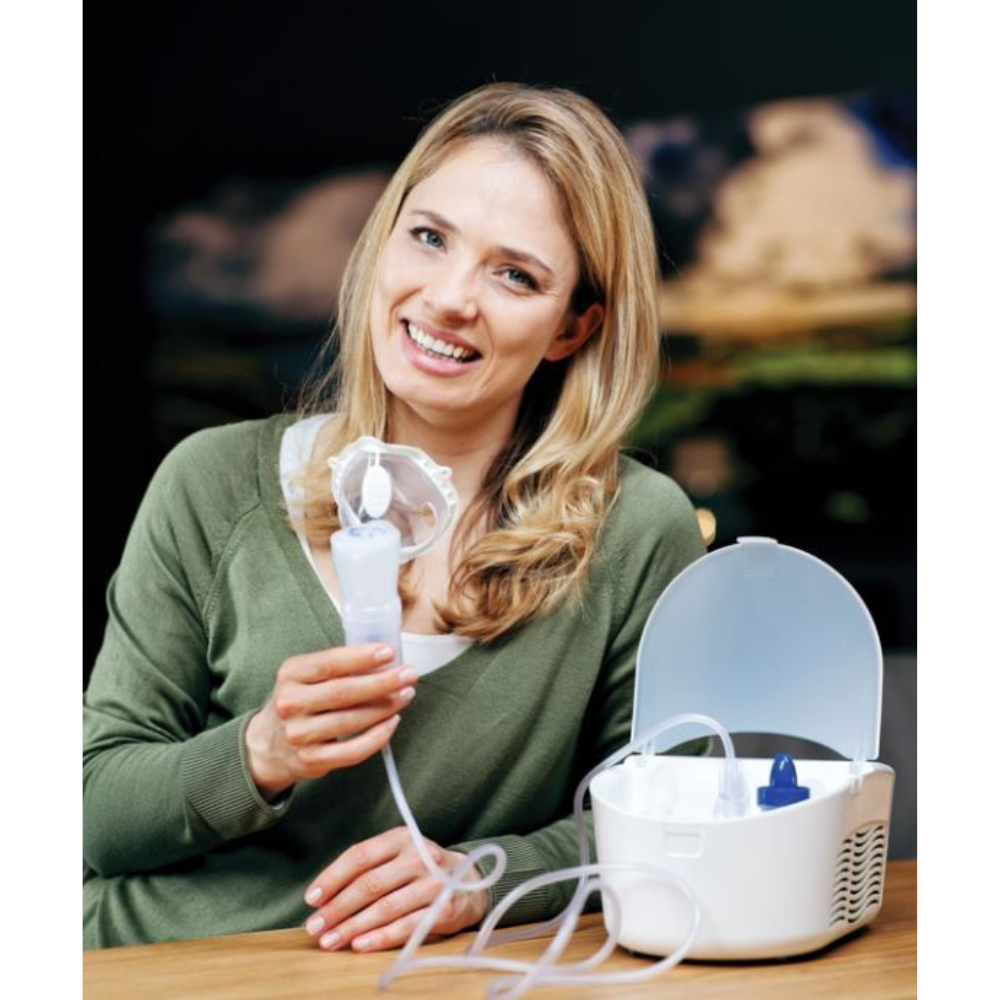Nebulisers for COPD
Nebulisers treat various different health conditions, providing effective treatment and relief for COPD sufferers. Nebulisers for COPD come in many different shapes, sizes and types; here, we will discuss the benefits of using a nebuliser for your COPD.
What is COPD?
COPD stands for Chronic Obstructive Pulmonary Disease, and is the name for a collection of lung conditions that affect a persons breathing. The disease causes restricted airflow and breathing problems, usually caused by smoking and air pollution. COPD typically affects those from mid-life onwards, making daily tasks difficult as breathlessness overtakes them. Emphysema and chronic bronchitis are two of the most common conditions that fall under the umbrella term COPD.
Emphysema vs COPD
Emphysema occurs most often in people who smoke and people who regularly breathe in irritants. The irreversible condition, destroys the air sacs in your lungs (alveoli). The air sacs weaken, lose elasticity and eventually break down, which reduces the surface area of the lungs and the amount of oxygen that can reach the bloodstream, making it harder to breathe.
What are the symptoms of COPD?
Symptoms of COPD include:
- Increased breathlessness
- A persistent cough
- Persistent wheezing
- Phlegm
- Difficulty breathing
- Tiredness
- Frequent chest infections
- Weight loss
- Bluish-gray lips or fingernails
Although there is no cure for COPD, treatments such as bronchodilators (rescue inhaler), steroids, oxygen therapy, and pulmonary rehabilitation can help manage symptoms and improve quality of life. Without treatment, symptoms can increase and worsen over time.

Nebulisers for COPD
Nebulisers are widely used to treat and manage the different forms of COPD, including emphysema and chronic bronchitis. The simple-to-use devices quickly and efficiently deliver medicine to your lungs via a mouthpiece or facemask.
There are many different types of nebuliser devices that can effectively reduce the symptoms of COPD, from convenient travel and portable devices to home nebulisers.
What does a nebuliser do for COPD?
Nebulisers can benefit people with COPD, especially during exacerbations or when symptoms are severe.
Nebulisers deliver medication directly to the lungs as a fine mist, allowing it to work more quickly and effectively than oral medications. This can help to reduce symptoms such as shortness of breath, wheezing, and coughing.
Nebulisers can also help to reduce the risk of side effects associated with oral medications because they deliver the medication directly to the lungs, avoiding the digestive system.
However, it is essential to note that nebulisers are not always necessary for everyone with COPD. Some people may prefer other delivery methods, such as inhalers or oral medications. It is important to work with a healthcare provider to determine the most appropriate treatment plan for your needs.
The decision to use a nebuliser for COPD treatment is based on your specific needs and the severity. The stage of COPD is not the only factor to consider when deciding whether or not to use a nebuliser. Therefore, it’s essential to consult a healthcare professional to determine the appropriate treatment plan for your specific case.
What are the benefits of using a nebuliser for COPD?
There are many benefits to using a nebuliser for treating your COPD, including:
- Effective medication delivery: Nebulisers deliver medication directly to the lungs, which can be particularly helpful for people with COPD who may have difficulty using an inhaler.
- Large medication volume: Nebulisers can accommodate for larger medication volumes, beneficial to those requiring high doses or multiple medications.
- Quick symptom relief: Nebulisers can quickly relieve symptoms such as shortness of breath, wheezing, and coughing.
- Reduced risk of side effects: Nebulisers can help reduce the risk of side effects associated with oral medications.
- Consistent dosage: Nebulisers can provide a consistent dosage of medication.
- Useful during exacerbations: Nebulisers provide relief fast.
- Portable options: Portable nebulisers are available which can help maintain treatment while still being able to participate in activities.

Travel nebulisers for COPD
A battery-powered nebuliser allows you to conveniently treat your COPD wherever you go. These nebulisers are small and lightweight, helping you manage your condition away from home. Delivering medication directly to your lungs for fast relief.
Our portable devices are simple to use, featuring one-button operation for the most straightforward experience. You should notify your healthcare provider if you plan to travel with your nebuliser.
What medicine do you put in a nebuliser for COPD?
Nebulisers are particularly useful for people with severe COPD or those who have difficulty using other inhaler devices. Nebulisers can also be helpful for people who require a higher dose of medication or those who need to take multiple medications to manage their COPD symptoms.
Your GP or healthcare professional will prescribe the correct medication for you and you should not use a nebuliser unless prescribed to do so. Your GP will advise what medication and how it should be taken i.e. through a nebuliser or inhaler.
Some medicines used in nebulisers for COPD include:
- Bronchodilators: These medications work by relaxing the airways’ muscles, making breathing easier. Examples include albuterol, levalbuterol, and ipratropium.
- Corticosteroids: These medications help reduce inflammation in the airways, making breathing easier. Examples include budesonide, fluticasone, and prednisone.
- Mucolytics: These medications help break up and thin out the mucus in the lungs, making it easier to cough it up. Examples include acetylcysteine and hypertonic saline.

